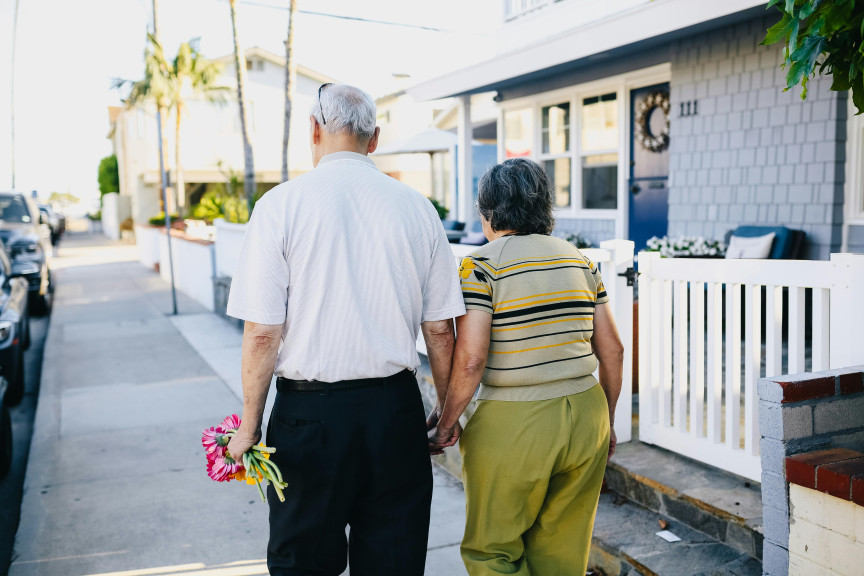Misconceptions about older adults’ sexuality can cause ageist beliefs. Here’s what one study found

Many people assume aging means losing interest in sex. A recent study sheds light on the misconceptions surrounding older adults' sexual lives. RDNE Stock project/Pexels
Society’s beliefs about aging and sex are complex and vary widely, but one common belief is that disinterest in sex is a standard part of aging. A recent study explores how misconceptions like these can complicate the acceptance of older adults’ sexual lives.
The study surveyed 270 young adults, ages 18 to 35, about their perceptions of sexuality in older adulthood, general attitudes towards sex and sex as a leisure activity. It was conducted by Liza Berdychevsky, professor of recreation, sport and tourism at the University of Illinois at Urbana-Champaign, and Iulia Fratila, an assistant professor of global and community health at George Mason University.
“The entire premise is: How do we combat ageism?” Berdychevsky said.
The study found that young adults have a moderate level of knowledge and are typically open-minded regarding later-life sexuality. But it also revealed the ageist views and misconceptions that can potentially harm older adults’ sexual expression.
More than one in four young adults surveyed incorrectly believed that sex might increase the chance of heart attacks for older folks. About 12% mistakenly thought that sex in later years could be bad for health overall. And roughly one in five were under the wrong impression that older men and women can't be partners to each other for sex, thinking instead that they need younger partners for any sexual connection.
Older adults can internalize ageism, Fratila said, leading them to limit their willingness and confidence to seek help if issues with their sexual life do arise.
“We see a lot in movies, that older adults become asexual, or that it’s a dirty, creepy phenomenon to have sexual interest still as you get older,” Fratila said. “It might just hurt their psychological well-being and self-esteem, being marginalized or stereotyped in that way.”
It’s a shame, she said, because these false ideas “[don’t] allow people to actually pursue the maximum health that they can, given that sexual health is a part of our overall well-being.”
In an earlier study, Berdychevsky spoke with older adults about ageist beliefs they’ve encountered. Many said that at least some of these ideas came from uninformed health care providers or close family members — like adult children — who did not appreciate the idea of their parents having sexual relations.
The new study also found that some participants would be reluctant to admit a relative to a nursing home that allowed and supported sexual activity among its residents.
“I think they should view it through the lens of: Am I infringing on my relative’s sexual expression rights? And if the answer is yes, then rethink your position,” Berdychevsky said. “It's up to them. The infrastructure for privacy and intimacy and sexual relationships need to be provided, and then it's up to older adults whether to take advantage of that.”
Illinois Student Newsroom spoke with young people on the campus of the University of Illinois at Urbana-Champaign, to see what they thought about the topic of aging and sex.
“It's that idea that there's a prime of your age – the idea that a senior citizen is not as capable as someone who's younger,” said a UIUC student who didn't want to be identifed. “So we just feel that they're just not part of normal life, so they shouldn't be doing those ‘un-innocent’ activities.”
Numerous research studies show that sexual activity in later life has numerous health benefits, including improved cardiovascular function, relaxation, and decreased pain sensitivity and depressive symptoms. Fratila also noted the psychological and social benefits.
“It doesn't stop after our reproductive years,” Fratila said. “This is something that can be a glue for relationships, it can be something that's empowering for individuals when they're able to practice safe sex, and sex that is adaptable to where they are in their life stage. It doesn't have to look like how it [did] when you were younger.”
When asked what age they thought adults stopped having sex, Alex Lopez, a UIUC freshman, guessed somewhere in their 30s.
“I have no idea,” they said. “At least for me in middle school, I had no sex ed, and then in high school as well. I got educated by a friend of mine during a free period in a classroom.”
Berdychevsky said the next steps are to focus on developing appropriate sexual health education throughout life.
“It has to be tailored to [a] particular life stage with the focus that there's no expiration date on sexuality,” Berdychevsky said. “It's not only older adults. It's not only younger adults. [Sex] can continue to be enjoyed, perhaps differently at every life stage, but it still comes with all its benefits.”
Better sexual education of young people, the researchers said, could help alleviate fears many young people have about mortality and aging.
Mallory Miller, a junior at UIUC, said she believes more representation would also be beneficial.
“We only hear about sex with people who have the ‘perfect’ bodies or early 20-year-olds or college students,” Miller said. “You don't even realize that it happens at all ages. I think it'd be great if we could change that mental imagery to something that's more inclusive.”
Currently, Berdychevsky is spearheading another project – an app with tailored sexual health education messages for older adults. Her team has already developed 30 modules and is working on an algorithm and screener.
“Every good thing in our life requires some work, and ageist stereotypes tend to inhibit some people's ability to do that work because it's not viewed as worthy or as appropriate or whatnot,” Berdychevsky said. “Removing that ageist inhibition is so crucially important, so that people could act upon their change in needs and desires and get that fulfillment that they're looking for.”

